We’ve carried out our own survey, crunched some numbers, and done additional research to proudly present our SEO statistics for 2024, providing an idea of where the industry’s headed in 2024.
- SEO Statistics in a Nutshell
- How Many People Use Search Engines When Shopping?
- Search Engines vs Social Media in the Buying Journey
- SEO Careers: How Many People Work in SEO?
- SEO Demand Statistics
- 7 Other SEO Facts, Figures and Numbers
- Search Engine Market Share
- SEO – Alive and Thriving in 2023 and Beyond
For those of you who’ve built careers out of winning search engine visibility, the significance of search as a marketing channel needs no introduction. Every single year, Google Trends shows demand for SEO agencies on the up, while simultaneously articles around the web sound the death knell of the SEO industry.
Honestly, we don’t need anymore “SEO is dead,” articles, ok?
There’s no denying the significance of SEO as a marketing channel for any business whose customers are online (almost all of them, right?). But just how big is the SEO opportunity, how important are search engines in the buying journey of today’s consumers and just how much clout does Google have?
We’ve carried out our own survey, crunched some numbers, and done additional research to proudly present our SEO statistics for 2022 and 2023, providing an idea of where the industry’s headed in 2024.
SEO Statistics in a Nutshell
So this report is packed full of facts, figures and numbers. But if you’re just looking for a quick fix, we’ve put together the most important findings in summary here:
- 42% of people in the UK use search engines when looking for a product or service
- That’s more than double the number that use social media and more than four times the number that use providers they’ve seen advertising on TV
- There are 207,000 people with SEO in their titles listed on LinkedIn as of July 2022
- Demand for SEO courses increased over 500% between January 2016 and January 2022
- Around a third of those looking for jobs in SEO are looking for management level opportunities
- On the whole, pages with more backlinks get more traffic from Google
- A relevant search influenced 39% of purchasers
- 88% of marketers who already invest in SEO maintained the same amount or allocated more in 2023
If you want more context, detail and background, read on.
How Many People Use Search Engines When Shopping?
There’s every chance that it was Google (or another search engine of course) that brought you to this very page today. But what about when people are actually in shopping mode. How big a role do search engines play in decision making when consumers are about to part with their hard earned cash?
We polled 2,001 people in the UK in July 2022 to find out.
We asked them (using market research provider, Censuswide):
- Which of the following, if any, do you do when looking for a new product or service? (Tick all that apply)
- Use a search engine (e.g. Google or Bing)
- Use social media outlook for recommendations or providers
- Buy from providers I’ve seen advertise on TV
- Buy from providers heard advertise on the radio
- Go to a directory website (e.g. Yell or similar) to look for providers
- Go directly to a specific retailer’s website (without using a search engine or social media first)
- Ask friends for recommendations
- To a brick and mortar shop (i.e a physical store)
- None of the above
The answers reiterate the importance of multiple channels in your marketing efforts.
The statistics tell us:
- 42% of adults in the UK use a search engine when looking for a new product or service, making this the single most utilised method from our list of options
- This represents more than double the number who use social media and more than quadruple the number who buy from those advertising on TV
- While directory websites might be associated with old fashioned link building in the SEO industry, a not-insignificant 17.8% of consumers will use them to find providers
- More people will rely on search engines than recommendations from their friends when on the hunt for a new product or service
Here are the responses in full.
| Which of the following, if any, do you do when looking for a new product or service?
(Tick all that apply) |
|
| Response | % of People Who Selected this Response |
| Use a search engine (e.g. Google or Bing) | 41.83% |
| Ask friends for recommendations | 36.93% |
| Go to a brick and mortar shop | 24.94% |
| Go directly to a specific retailer/company’s website (without using search engines or social media first) | 23.64% |
| Use social media to look for recommendations/providers | 20.34% |
| Go to a directory website (e.g. yell.com or similar) to find providers | 17.84% |
| Buy from providers I’ve seen advertised on the TV | 10.29% |
| Buy from providers I’ve heard advertised on the radio | 8.95% |
| None of the above | 2.35% |
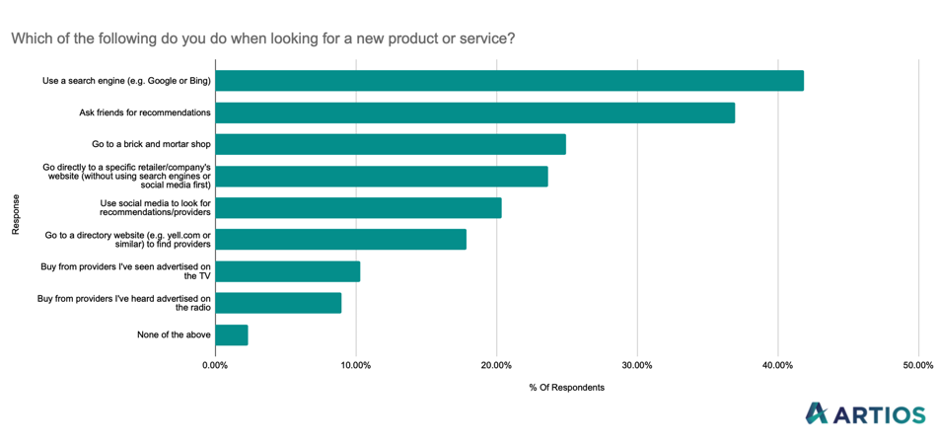
Of course, these figures from the UK only reveal so much. We delved into research conducted by other companies and groups for recent insights into search engines and shopping from other parts of the world. This is what we found:
- 35% of US users conduct local business searches online multiple times a week
- 92.93% of mobile searches took place on Google in 2022
Search Engines vs Social Media in the Buying Journey
The overall data shows us that more than double the number of UK consumers will use a search engine when hunting out a new product or service as will use social media.
But this really does vary wildly by age group.
As a general rule, younger adults are more likely to engage with social (especially influencers) in the buying journey than older ones. Here’s what the statistics say:
| Age Group | % who use search engines when looking for new products and services | % who use social media when looking for new products and services |
| 16 – 24 | 26% | 25% |
| 24 – 34 | 40% | 29% |
| 35 – 44 | 43% | 25% |
| 45 – 54 | 46% | 19% |
| 55+ | 46% | 13% |
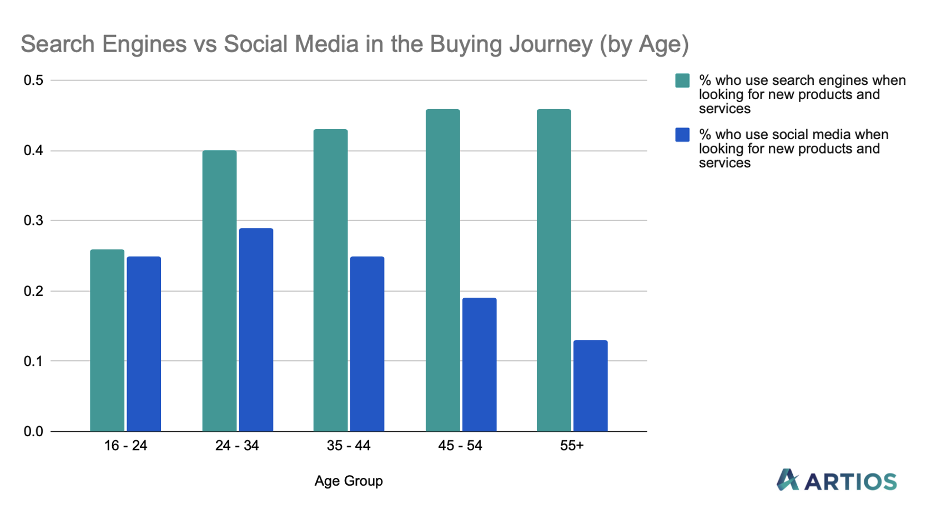
Search Engines, SEO, and Reviews in the Buying Journey
Recent figures show that search engine reviews are playing an increasingly important role in the buying journey, especially where local businesses are concerned. It’s important to understand that while user-generated reviews do not have a direct impact on SEO, they can be helpful in boosting a site’s search engine results page (SERP) rankings.
According to BrightLocal’s research:
- 98% of buyers read online reviews of local businesses
- 81% of buyers choose Google reviews in 2021, up from 63% in 2020
- 53% of buyers chose Yelp reviews in 2021, up from 32% in 2020
- 48% of buyers chose Facebook reviews, down from 54% in 2020
- 93% of buyers have made purchasing decisions based on an online review
Local SEO is Important
With so many SEO statistics looking at major trends in large geographic regions or internationally, it can be easy to underestimate the importance of local SEO. However, as the following statistics indicate, businesses who serve local customers should ensure that they have a good local search presence:
- 30% of mobile searches are location-related
- 76% of buyers who search for something nearby using their smartphone visit a local business within 24 hours
- 28% of searches for something nearby lead to a purchase
- 54% of smartphone users search for local business hours, while 53% search for directions to local retailers
- 45% of buyers around the world buy online before collecting their purchases in-store
- “Where to buy” + “near me” mobile queries grew by more than 200% from 2017 to 2019
- “Store open near me” and “on sale” + “near me” mobile queries each grew by more than 250% from 2017 to 2019
The State of Video SEO
Video content’s rise in prominence, especially among younger-generation web and mobile phone users, has made video SEO a vital part of effective SEO strategies. The following statistics and facts offer insights into the state of video SEO:
- 68.2% of YouTube results on the first page are HD videos
- There’s a strong correlation between the number of likes, shares, views, and comments and higher YouTube rankings
- The average length of first-page YouTube videos is 14 minutes and 50 seconds
- Video content has a 41% higher click-through rate than plain text results
- 26% of searches include a video thumbnail among the results
Important Voice Search Statistics
With more than 1 billion voice searches performed every month, no SEO strategy or agency can afford to overlook SEO for voice search. Let’s break down this impressive figure with a few of Forbes statistics:
- 50% of buyers in the US use voice search on a daily basis
- 20% of Google App searches are made via voice search
- 70% of voice search results are pulled from People Also Ask and Featured Snippets
- The average voice search is 29 words long
- The average voice search is longer than the average text-based search
- The number of monthly voice searches is expected to increase to 2 billion by 2024
- 48% of buyers use voice search for general web searches
- Websites with a robust link authority usually rank well in voice search results
- The average voice search result has a Grade 9 reading level
- The market share of the top voice assistants is Google at 36%, Apple’s Siri at 36%, Microsoft Cortana at 19%, Amazon Alexa at 25%, and others at 1%
With statistics like these, it’s important that business websites support voice search by targeting long-tailed keywords such as question keywords, using schema makeup, optimising speed, and focusing on local SEO.
SEO Employment Opportunities
Globally, SEO job searches have risen from 3,600 in 2016 to 14,800 in 2023. As global marketing investment is set to increase by 8.2% in 2024, there are plenty of opportunities for those looking for work in the SEO sector.
According to Indeed, there are currently 2,591 SEO jobs in the UK. Of these, 796 were hybrid remote, and only 76 were fully remote.
When looking at job locations in the UK, these were the top five:
- London (767)
- England (139)
- Manchester (91)
- Leeds (67)
- Birmingham (58)
It’s evident that as the SEO industry grows, so too do job opportunities and earning potential.
The average salary for an SEO specialist is £33,030 a year. Most SEO salaries on Indeed are listed as £25,000+, with the top earnings of £50,000. However, some agencies may pay more, depending on an SEO’s skills, expertise, and experience.
SEO Careers: How Many People Work in SEO?
While it would be impossible to say for sure how many people work in SEO, Linkedin can give us a little bit of an idea.
A simple search on LinkedIn for all people with “SEO” in their titles returns a remarkable 207,000 people globally and 29,000 in the UK alone.
The demand for SEO courses, qualifications and careers has grown astronomically over recent years.
To gauge the demand, we turned to keyword data. We used kwfinder.com to obtain estimates for the number of people who searched for various keywords around SEO careers and qualifications over time.
We found that, as we’d expect (new year, new you!) January is the peak month for SEO jobs searches in most years (2022 so far the exception).
So if we look just searches in the January of each year from 2016 to 2022:
- Searches globally for “SEO jobs” have risen from 3,600 in January 2016 to 14,800 in January 2023 – an increase of 311%
- At the same time, demand for “SEO courses” has grown from 2,945 searches to 18,100 – a whopping 654% increase
There’s a clear correlation between those looking to learn and those looking for jobs in SEO.
We looked at searches per month for specific SEO job levels too, assessing the numbers for each of the following keywords:
- Entry level SEO jobs
- SEO executive jobs
- SEO manager jobs
- Head of SEO jobs
- SEO director jobs
If we look at global searches in the most recent month of data (March 2024) we can see that across those queries, we see a forecasted 3,260 searches. Here’s how they broke down.
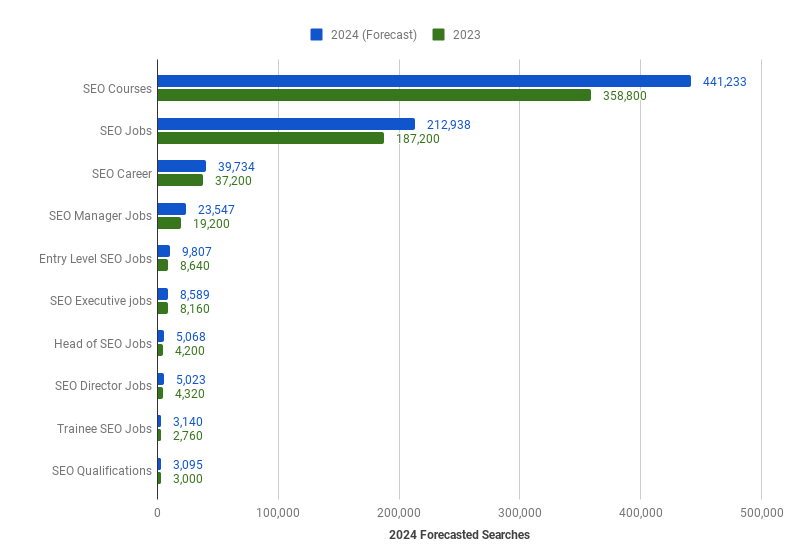
Almost half of the data split between these queries suggested searches are for more junior roles. A third of SEO job hunters are, our numbers suggest, looking for manager level roles, while fewer than 1 in 10 job seekers in the industry are looking for head of or director roles.
And in terms of how those numbers have looked over the years:
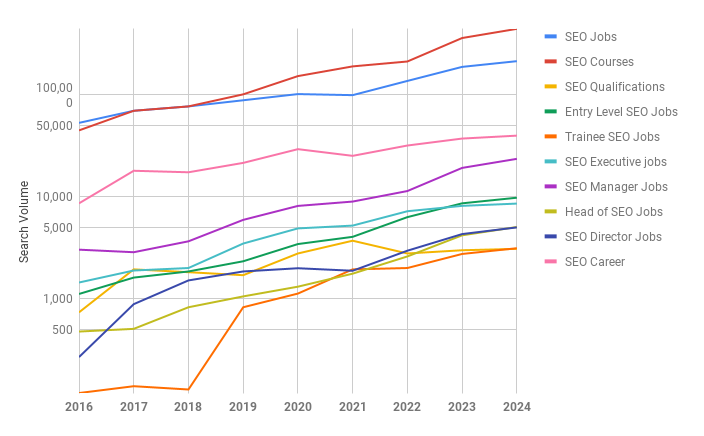
If we add up the search volume for all of the queries we assessed for each month of 2016 to 2024, we can see trends annually.
| 2016 | 2017 | 2018 | 2019 | 2020 | 2021 | 2022 | 2023 | 2024 (Forecast) | |
| SEO Jobs | 53000 | 69600 | 76800 | 88200 | 101400 | 99000 | 136400 | 187200 | 212938 |
| SEO Courses | 44725 | 69600 | 76800 | 100800 | 152100 | 189300 | 211400 | 358800 | 441233 |
| SEO Qualifications | 740 | 1950 | 1830 | 1710 | 2790 | 3720 | 2790 | 3000 | 3095 |
| Entry Level SEO Jobs | 1120 | 1620 | 1860 | 2340 | 3450 | 4060 | 6330 | 8640 | 9807 |
| Trainee SEO Jobs | 120 | 140 | 130 | 830 | 1130 | 1950 | 2010 | 2760 | 3140 |
| SEO Executive jobs | 1450 | 1900 | 2010 | 3490 | 4910 | 5230 | 7230 | 8160 | 8589 |
| SEO Manager Jobs | 3040 | 2870 | 3670 | 5950 | 8150 | 8990 | 11400 | 19200 | 23547 |
| Head of SEO Jobs | 480 | 510 | 830 | 1060 | 1320 | 1770 | 2610 | 4200 | 5068 |
| SEO Director Jobs | 270 | 890 | 1520 | 1860 | 2000 | 1890 | 2970 | 4320 | 5023 |
| SEO Career | 8638 | 18000 | 17400 | 21500 | 29300 | 25200 | 31800 | 37200 | 39734 |
In 2020, we saw significant surges in demand in search for SEO glossaries, courses (including Python programming) and roles. This is likely linked to the covid pandemic. And, although searches did drop slightly in 2021, they remained notably higher than their pre pandemic 2019 levels, have surged to an all time high in 2023 and are forecasted to surge higher in 2024.
SEO Industry Salaries
Recent research reveals significant discrepancies in SEO industry salaries in various regions around the world. Surprisingly, the highest average salaries for SEO professionals are not found in the UK or the US. Manaferra’s research indicates how drastically average SEO salaries can vary across 10 different countries:
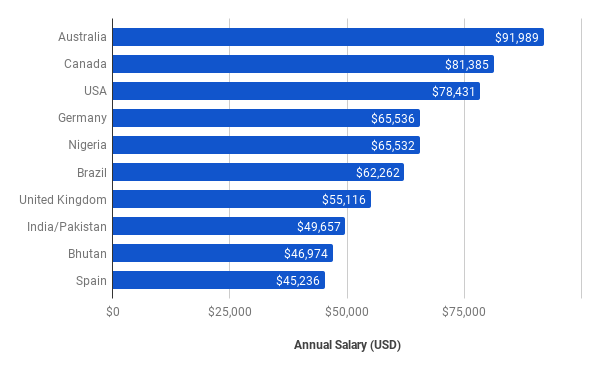
| Country | Salary (USD) |
| Australia | $91,989 |
| Canada | $81,385 |
| USA | $78,431 |
| Germany | $65,536 |
| Nigeria | $65,532 |
| Brazil | $62,262 |
| United Kingdom | $55,116 |
| India/Pakistan | $49,657 |
| Bhutan | $46,974 |
| Spain | $45,236 |
SEO Demand Statistics
Using a similar methodology as the above, assessing search volume over time, we can see growth in demand for services over time as well. We’ve assessed search volume for queries like “SEO consultant” and “SEO agency,” (amongst others) over time.
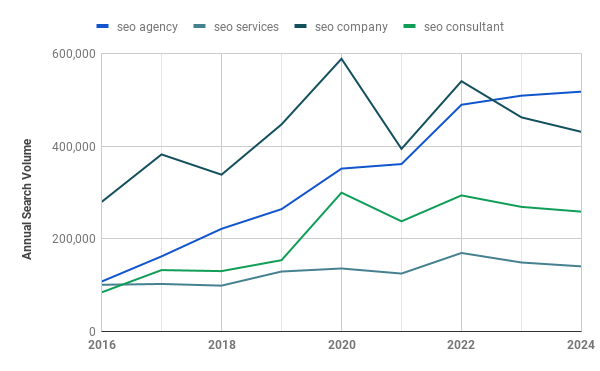
We added up global searches for each month of the year from 2016 to 2022 and found that demand for services has also increased over the last half decade. Much like with jobs and courses, demand surged astronomically throughout the pandemic. Although many of the search terms took a dip in 2021, all 4 of the keywords showed a marked year-on-year increase in 2022.
| Year | 2016 | 2017 | 2018 | 2019 | 2020 | 2021 | 2022 | 2023 | 2024 (Forecast) |
| seo agency | 107600 | 162000 | 221500 | 263900 | 351400 | 361200 | 489200 | 508,800 | 517,480 |
| seo services | 100676 | 102478 | 98874 | 129311 | 135884 | 124929 | 169368 | 148,800 | 140,433 |
| seo company | 279385 | 382000 | 338300 | 446800 | 588400 | 394000 | 540000 | 462,000 | 430,699 |
| seo consultant | 84299 | 132400 | 130200 | 153800 | 299500 | 237700 | 293600 | 268,800 | 258,498 |
So, despite the fact you will find no fewer than 44,000 pages in the Google search results for “SEO is dead,” (in quotation marks), demand would suggest otherwise for SEO agency.
The people searching for SEO jobs online have not been looking in futility, as the industry’s growth means the number of roles available in digital marketing agencies and in-house marketing departments is increasing. According to the BLS, the demand for SEO professionals is predicted to increase by 22% between 2020 and 2030. This is reflected in predictions of the SEO services market growing to $217,846,000 by 2030.
SEO Industry Insights for 2024
Having looked at growth and demand, let’s turn our attention to a couple of SEO industry insights regarding small business budgets and SEO agencies fees. Forbes revealed that:
- The average American small business’ monthly SEO budget is $497.16
- SEO agencies in the US charge an average of $3,209 per month for their services
Given that the average agency’s fees far exceed the average small business’ SEO budget, small businesses are faced with several options. These include handling their own SEO where possible, working with agencies with low-cost options, startup agencies and freelancers who specialise in SEO, or foregoing SEO entirely. While small businesses are slowly becoming more aware of the importance and benefits of SEO, more agencies might consider introducing low-cost options and packages aimed at SMEs.
The Use of AI in SEO in 2024
AI has undoubtedly been one of the most significant steps forward in terms of both B2B and business-to-consumer relationships in recent years.
Not only that, but it’s also changing and challenging the way we understand data, serving as a tool for uncovering new insights and SEO strategies that continue to evolve every day. AI is influencing the way we develop SEO strategies and allows us to constantly improve and refine them over time.
So what is the SEO-AI landscape looking like in 2023, and what can we expect from 2024? These stats speak for themselves.
- 58% of businesses are poised to integrate AI into their marketing strategy in 2024
- Marketers that use AI noticed a 6-10% increase in revenue in 2023
- SEO is the number one reason behind ChatGPT use (mainly for content generation, generating Schema markup, and keyword research)
4 Key AI SEO Trends To Look Out For In 2024
Keeping tabs on what’s working and what’s not is essential for every business. We’ve rounded up four trends to watch for AI SEO integrations for 2024:
- AI Content Creation On The Rise
According to Forbes Advisor, between 30-44% of businesses are using AI to create written content for their website blogs, i.e. their SEO strategies. Producing original, captivating content is tantamount to SEO success these days, and AI programs like ChatGPT, Writesonic, and Jasper are playing a crucial role in speeding up and simplifying that process.
- Competitive Keyword Research Increases
According to BrightEdge, AI-driven keyword research tools can improve your SEO content’s online performance by as much as 45%. It also drastically simplifies and speeds up the process of researching high-performance keywords.
More and more businesses are incorporating intelligent keyword research tools to uncover long-tail keywords with the ideal combination of low competition and high search value, thus increasing online visibility and enhancing your search engine rankings.
- Optimising Websites and Webpages
Slow website loading times are one of the biggest contributors to bounce rates. Fortunately, AI-driven tools and platforms can optimise loading speeds and create sites that consumers are motivated to stay on within the first few seconds of arriving.
AI webpage optimisation software platforms like Clearscope, Semrush, and Frase have already increased on-site optimisation by as much as 38%.
- AI-Driven Data Analytics Management
81% of business executives are already using AI analytics programs to track site performance in 2023, and the number is growing every day. Using AI to manage and understand data just makes sense – it is already primed to process vast quantities of data and arrange them in a simple, easy-to-understand way.
Companies that don’t use AI-driven data analytics programs are likely to be left in the dust of those who do in 2024. These systems are designed to be able to work through such enormous volumes of data with such speed and accuracy that analysing them manually no longer makes practical sense.
The right AI-powered analysis tool not only saves businesses time but can also increase sales (sometimes by as much as 30%) and improve ROI.
Whether you’re a fan of AI or still on the sceptical side, these figures tell us that it isn’t likely to go anywhere anytime soon. AI may not be perfect, but realistically, it’s the companies that choose to work with AI rather than against it that will be most likely to succeed in 2024.
7 Other SEO Facts, Figures and Numbers
So, demand for SEO jobs is on the up. Demand for services is on the up. And consumers remain twice as likely to use search engines in their buying journeys. AI is set to have a major impact on the SEO industry. We’ve also collated other statistics from further reports highlighting the importance and significance of search.
- A Brightedge study found that over half of all traffic across the web is driven by organic search
- The same study found search is responsible for driving over 1000% more traffic than social to websites across the internet
- Over 90% of content on the web gets absolutely no traffic from Google at all
- Almost 70% of the queries people type into Google are made up of 4 words or more
- The same study found that over 92% of queries are searched 10 times or fewer per month emphasising the importance of a focus on the long tail
- Google revealed in 2016 that some 30% of all searches made on a mobile have a local element (people looking for service or things near to them)
- Featured snippets get around 35% of total click share. So yes, it’s still worth having them even if the queries for which they show can be a little unpredictable
Search Engine Market Share
According to February 2023 data from Statcounter, Google’s global market share is over 90%. Here’s the breakdown.
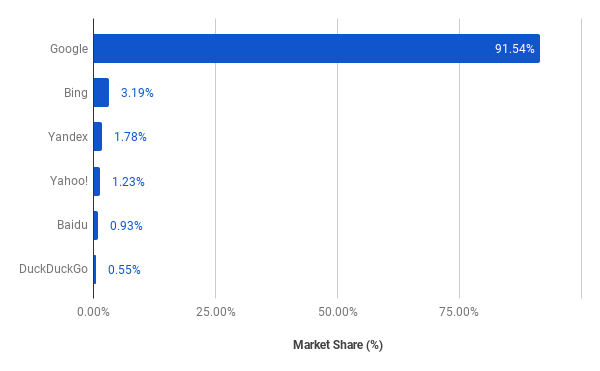
So despite various sources claiming some search engines are closing the gap on Google, this data, along with previous data released by Sparktoro and Jumpshot in 2018, suggests that Google still very much has the monopoly on search – and other “contenders” barely get a look in.
Search engine market share figures from November 2022 through November 2023 bear this out. Even though Google did see a minuscule drop, the company still leads the way by far. According to Statcounter, the main contenders have the following market share:
| Search Engine | Market Share (%) |
| 91.54% | |
| Bing | 3.19% |
| Yandex | 1.78% |
| Yahoo! | 1.23% |
| Baidu | 0.93% |
| DuckDuckGo | 0.55% |
The Cost Of SEO
An increase in digital ad spend has contributed to the surge in demand for SEO consultants, and industry revenue reflects this. In the UK, the SEO market’s five-year compound growth rate was 11.2%, and in 2023, the market is worth £19.2 billion. It’s estimated that by 2028, it could reach as high as £25 billion. Globally, the market was worth $68.27 billion in 2022, and it’s expected to grow at a CAGR of 8.7% between 2023 and 2032, when it will be worth $122.11 billion.
For businesses big and small, having an online presence is crucial, and factoring SEO into a marketing budget is no longer a luxury but a necessity.
The average cost of SEO services a month depends on your business, its size and sector, and your target audience’s location. Local SEO benefits regional businesses in a specific location, while global SEO benefits a business or brand that has a national, multi-national or global appeal.
The agency costs also depend on the type of SEO services provided, the expertise of the company, and how long they’ve been established.
- In the UK, the typical average monthly SEO agency costs vary between £1650 and £5500 a month for local SEO services.
- For global SEO services, a national or international campaign requires a minimum budget of $2,500 to $5,000 a month.
Agency Revenue
With a clear idea of what SEO costs, it’s time to look at the other side of the coin – what SEO agencies are making revenue-wise.
According to a study by Ahrefs, SEO agencies charge more per hour than freelancers, but this is the standard in almost all industries where freelancers and agencies co-exist. For a freelancer to start up their own solo business in the UK, costs are estimated at around £1,500, while start-up costs for an SEO agency can cost anywhere from £5,000 to £50,000.
Of course, overheads like staffing, premises, marketing (yes, SEO agencies need to market too. In fact, this is crucial as it proves their expertise), and other costs can eat into bottom lines. But on average, it’s expected that a good profit margin for an SEO agency is between 11%-20%. Some agencies may push these margins to as high as 50%, but these tend to be agencies with large clients who have a global reach.
Typically, an agency will charge between two and five times what it costs to achieve a business or brand’s goals. However, SEO agencies that focus on different specialisms also have different profit margins.
Some of the profit margin averages in 2023 include:
- PPC Digital Marketing Agency: between 10%-30% of a client’s budget.
- Social Media Marketing Agency: profit margins between 11%-20%.
- Local Lead Generation Agency Model: profit margins between 85%-90%.
If we look at Statista’s report for 2022, it was estimated that digital agency revenue as a whole topped £16.6 billion. This figure has tripled since 2012 and is a clear indication that the advertising industry is focusing on the digital market – with SEO being a key factor.
Although more recent stats have not been made available, data from 2019 shows that Accenture Interactive was the leading digital agency in the UK in terms of revenue. Surpassing IBM iX and Atos Digital, Accenture Interactive made a whopping £370.5 million, while the runners-up made £282 and £251, respectively.
Predominant SEO Agency Specialisms
There are four core pillars of SEO:
- Technical SEO: Optimising a website for search engines and UX.
- Content: Creating content that improves web page rankings.
- On-site SEO: Optimising web pages for search engines.
- Digital PR: Optimising a site from external channels, e.g. PPC, social media marketing, link building, and guest blogs.
While some SEO agencies may offer services that encompass all four, others only cover one or two pillars or even a single sub-category of a pillar, such as link building or social media marketing.
Taking a look at the directory listing for 170 SEO agencies in the UK, it’s clear that PPC, web development and design, and SEO management are in-demand specialisms. Content is also in demand, with many SEO agencies focusing on content creation, keyword research, link building and digital marketing campaigns.
Looking further afield, the most common types of SEO specialisms are local SEO, ecommerce SEO and SEO audit services. eCommerce SEO is one of the fastest-growing sectors at present, and it’s estimated that by 2024, more than 21.2% of all retail sales will happen online. This will increase the demand for ecommerce SEO, not just globally but locally, too.
One area that doesn’t yet feature as a popular specialism is voice search. However, with 4.2 billion voice assistants already in use in 2023 and this number expected to reach 8.4 billion by 2024, voice search SEO is certainly going to be something that agencies are going to need to focus on. Especially when you consider that there are already over 1 billion voice searches a month!
SEO Agency Employee Numbers
In previous research that we conducted into the number of people working in SEO in the UK, we found that there were 29,000 LinkedIn users with SEO in their title. When we expanded this search to go global, our results showed 207,000 people.
IBISWorld, however, recorded 80,8058 employees in the UK who work in the SEO and internet marketing consultant industry. This is nearly three times the number we found on LinkedIn.
According to Statista, the number of advertising and media agency employees in the UK has grown dramatically from 2007 to 2022. This is in line with industry growth and reflects the increasing demand for digital marketing services. In 2007, there were 19,000 employees; by 2017, there were 25,000 and by 2022, there were just short of 30,000 employees.
The industry experienced a small dip in 2020 and 2021 due to the pandemic, but it has since recovered to record its highest numbers. While these statistics also include traditional forms of marketing, they provide a good overview of the growth in agency employment across the UK.
SEO – Alive and Thriving in 2024 and Beyond
For those of us in the industry, it’ll come as no surprise that search and SEO retains its importance. And while the state of play can always be somewhat unpredictable with Google’s ever changing landscape, the role of search engines in consumer buying behaviours is undeniable.
So whether you’re an SEO practitioner, a wider marketing professional or even simply a consumer looking for a product, search engines are a vital part of your day to day life.
Methodology and Caveats
Within this article, we used some existing data sources (credited within). But most of our data here is previously unseen. So we want to tell you a little about how we got it!
Our survey was conducted on our behalf by Censuswide. They put our question to 2,001 people from their own panel. The panel ws demographically representative and is an accurate representation of the general population aged 16 or over within the UK.
We chose Censuswide because the companies complies with the MRS Code of Conduct and ESOMAR principles, which centre around making data collection fair and accurate.
For our keyword volume analysis, we used data from kwfinder.com. Kwfinder.com provides estimates for the number of searches per month in Google for various keywords globally, by country, or specific parts of a country.
Much of kwfinder.com’s data comes from Google’s own Keyword Planner tool. You can find out more about how it gathers its data here.
- There are a few caveats to note in regard to search estimates like these:
- They should be regarded as estimates only used to identify trends and patterns as opposed to taken as exact figures
One search does not necessarily equate to one person searching. One person could make multiple searches for the same query over a month
You can see a copy of our raw survey data here.
